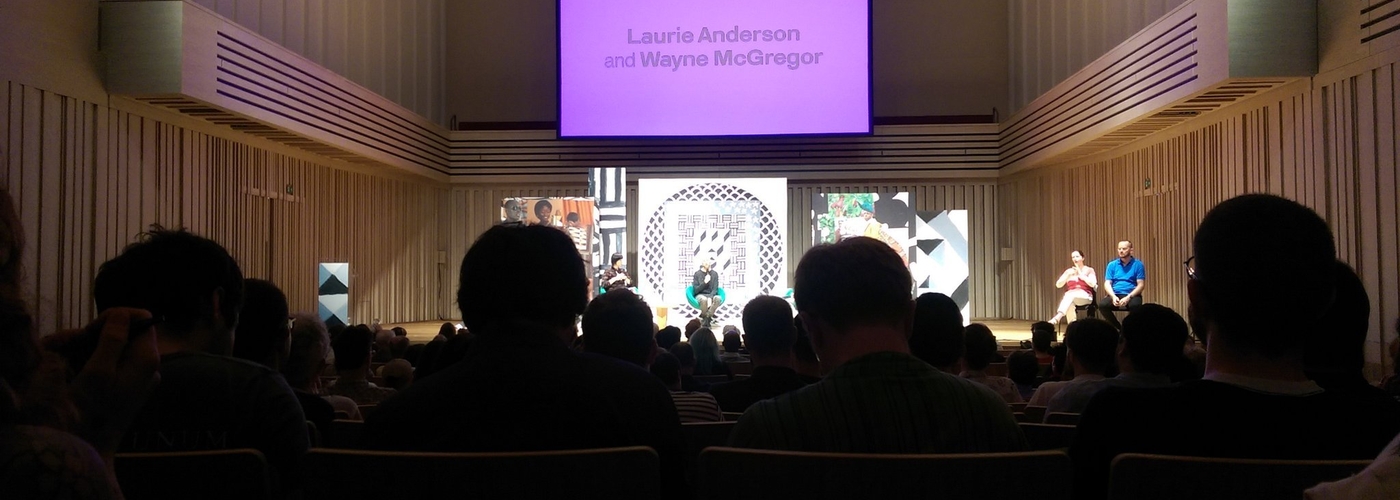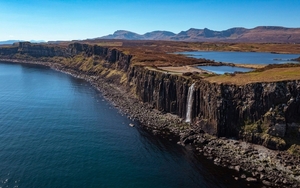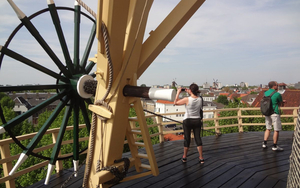We're totally f*cked, but there’s potential for resistance, writes Alun Richards
Stoller Hall, Sat 8 July
Laurie Anderson is many things – artist, musician, filmmaker. As it turns out, she’s also a great conversationalist. Within minutes of taking to the stage with choreographer Wayne McGregor, she’s covered The Communist Manifesto, tai chi and a woman of her acquaintance who rips phonebooks in half. “The secret is, she thinks about it for 25 minutes first.” With friends like that, who needs robots?
The answer, of course, is experimental dance choreographers. The first half of the discussion focuses on how the two artists incorporate technology into their work. A central question emerges: what is the relationship between body and mind, physicality and identity? McGregor talks about his project Becoming, which involves the creation of an AI dancer that performs alongside human beings. It’s about using technology to “make thought visible” and “excavate what the body knows”.
For Anderson, meanwhile, the appeal of technology is in how it lets us “lose the body”. She describes a virtual-reality scenario she’s constructed where the viewer finds himself abandoned in the middle of surgery – as he looks down at his exposed, beating heart, Anderson appears and relates a mundane anecdote. The point is, whether we’re embodying a computer program or disembodying a human being, technology gives us a new perspective on our physical existence and what it means for our sense of who we are.
With the arrival of Birgitta Jónsdóttir, the discussion turns political. Besides being a co-founder of the Pirate Party and member of the Icelandic parliament, Jónsdóttir was one of the producers of Wikileaks’s notorious 2010 video Collateral Murder. She talks about the brutal awakening she suffered when the US Department of Justice subpoenaed her metadata, which she describes as her “digital identity”.
Alternatively, you could just deny the existence of reality, as Anderson does when an audience member asks a question about euthanasia.
This is the darker side of technology: mass surveillance, data mining, people with power consolidating their control of those without. With characteristic bluntness, Jónsdóttir summarises it all by saying, “You’re totally fucked, by the way”. But despite the gallows humour, she still believes there’s potential for resistance. She highlights the Pirate Party’s “hacking” of Icelandic electoral politics as a sign of things to come. Alternatively, you could just deny the existence of reality, as Anderson does when an audience member asks a question about euthanasia. “But it’s a bit late in the panel to introduce that”.
The rest of the event consists of an interview with game designer Nina Freeman – whose MIF2017 commission, Lost Memories Dot Net, is available to play here – and a Guardian Live panel discussion, “How will AI change the world?”. Researchers Björn Schuller, Joanna Bryson and Tony Prescott talk about computers taking over human jobs, the therapeutic applications of robots and what AI actually means. “Being intelligent does not mean being human-like,” Bryson observes.
Partway through the discussion, Prescott introduces Elsie, a plastic rabbit-puppy that makes Clanger noises. Elsie behaves just like a real animal, which is to say unpredictably – Bryson tries to get its attention by waving and knocking on a table, but it ignores her completely. Glitchy programming or the Olympian disdain of a higher lifeform? Only time will tell.
The remaining Interdependence events will take place on Saturday 15 July at the Albert Hall. They are “We need to talk about truth” (10:30–13:00) and “We need to talk about change” (14:00–17:00). Information and tickets here.














